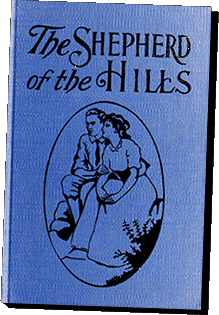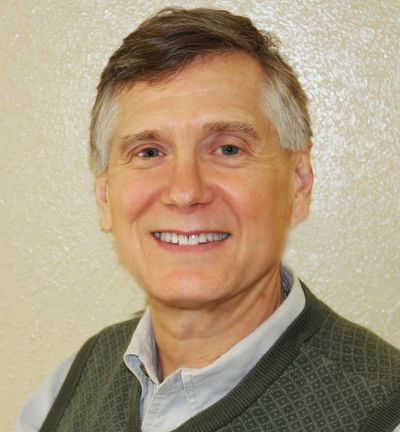The first million-selling novel in American publishing history

The Shepherd of the Hills was the book that put Harold Bell Wright on the national stage, but his career didn’t end there. As Wright’s popularity continued to grow so did the sales of his books. When A Son of His Father was published in 1925, it took 27 boxcars to transport the first printing of 600,000 copies (Lawrence Tagg, Harold Bell Wright: Storyteller to America).
How can one account for the success of Wright’s books? Certainly, the power of his imagination to create compelling stories and persuasive characters has much to do with his popularity. And he was an author particularly suited to his time. But more than anything, the generosity of his spirit endeared him to Americans. For Wright, how you live and what you do are always more important than what you say or what you claim to believe. His heroes and heroines are compassionate and forgiving–they tell the truth, regardless of how unpopular that truth might be–but they are also deeply concerned with justice, and they are courageous in their defense of the underdog, the oppressed, and the marginalized. Wright’s heroes despise hypocrisy.
The reason Wright understood heroism in these terms can be found in the desperate poverty and exploitation of his childhood. His mother died when he was 11, and his father was alcoholic and recklessly irresponsible. Wright found himself shifted from one household to another or living again with his father, who was hardly able to put food on the table. Several of those who took the boy in treated him as an outcast and forced him to work at arduous tasks far beyond his years. At the low point of his childhood, Wright was living with his father on the top floor of a saloon. His only friend was a hunchbacked old woman who washed dishes for the brothel next door. She became his mother figure and taught him what she could from the hardships of her own life. Wright discovered that love and encouragement have nothing to do with beauty or wealth. And he vowed never to exploit the poverty and misery of others for his own gain.
As a result, some of Wright’s works might seem too optimistic, too squeaky clean. But Wright never wavered from his notion that profiting from the misery of others was nothing more than exploitation because he had suffered exploitation himself. The virtues that Wright advocates are precisely those we need today: Forgiveness, compassion, a stalwart belief that the truth is always better than a lie, and righteous indignation at injustice.
In the end, these aren’t merely virtues we need like some sort of medicine, but virtues we deeply desire, like good food. We want friends who continue to love us even after we’ve let them down. We want to be trusted even when we’ve been posers. We want a home that is green and unspoiled and authentic. We want to be forgiven. In the end–when we’re honest with ourselves–we want to believe in The Shepherd of the Hills.
DR. HAYDEN HEAD
DR. HAYDEN HEAD is now professor emeritus of English, having retired from full time teaching in 2017. In 1999, he and his wife, Sue, and their two children, Heno and Lanie, moved back to the Ozarks from Irving, Texas, where Hayden earned his doctorate from the Institute of Philosophic Studies at the University of Dallas. His love of The Shepherd of the Hills, however, was bred in the bone, growing up as he did in the Missouri Ozarks: “Like so many other Ozarkers, I love the story of The Shepherd of the Hills! I’ve even had the chance to teach it a couple of times to my students in American literature. And I confess to a lifelong love of musicals. Thanks to Stan Beard, I have hope that my love for musicals and for this story will come together on the stage. I will never forget listening to Stan’s score for the first time—with tears in my eyes—so grateful that I could work with such a talented composer.” Thank you for joining us in what has been a labor of love. Long live the Shepherd!
STAN BEARD
STAN BEARD is a musician, vocalist, arranger, composer, and often not one at a time. Stan has performed in concert halls in every state in the USA and in more than two-dozen other countries. Appropriately enough, this Pennsylvania native began his career with renowned entertainer, Fred Waring and the Pennsylvanians, becoming the group’s youngest choral director at age 20. The stages and studios of California then drew Stan to a musical world that ranged from his tenure with The Carol Burnett Show, and tours with the likes of Ray Conniff, and Doc Severinsen, to singing with
Streisand and Sinatra. His varied skills have well-served his long association with Disney on Ice, where he has been musical director for more than three decades. “Just try directing Goofy in Mandarin Chinese, Aladdin in Dutch, and Donald Duck in Italian, without cracking up! I dare ya.” Writing or producing thousands of commercial jingles (American Airlines to Zenith TV’s) and several films and TV movies carry his name right after the words “Music by . . . “. Here in Branson, it’s been 21 years since Stan composed the title song and score for “Listen to the River” to open Silver Dollar City’s Opera House. Since then his music has graced SDC’s productions of “A Dickens Christmas Carol,” “It’s a Wonderful Life,” “Headin’ West,” “Living Nativity,” the parades, and other events at the park. “Branson and the Ozarks remind me of my Pennsylvania roots. Not just the land, even more so, the people. What a joy to team up with Hayden in this retelling of Harold Bell Wright’s great story. I felt I knew many of the characters from my rural Appalachian foothills upbringing. Old Matt was Pop, my grandfather. I am honored to dedicate my work on SHEPHERD to his memory.”


